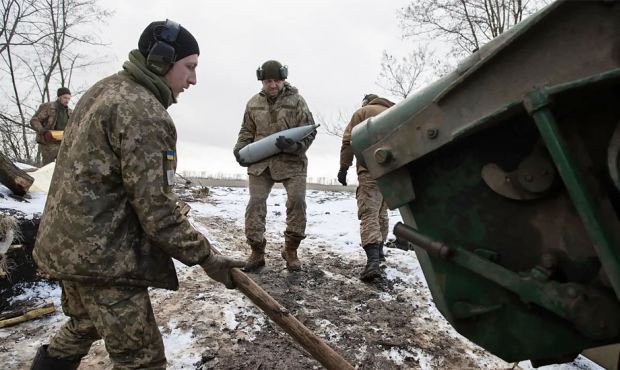The U.S. vows allies will get more ammunition to Ukraine ‘as quickly as possible
With Russia bearing down on a strategically important city in eastern Ukraine, NATO defense ministers promised continued military support to Kyiv, whose forces are expending ammunition faster than allies can produce it

With Russia bearing down on a strategically important city in eastern Ukraine, NATO defense ministers promised continued military support to Kyiv, whose forces are expending ammunition faster than allies can produce it.
As Russia continues to make gains — particularly around the fiercely contested eastern city of Bakhmut — and the war nears its first anniversary, the U.S. defense secretary, Lloyd J. Austin III, said Western nations were focusing on Kyiv’s “most pressing needs,” including tactical training that could reduce Ukraine’s dependence on artillery fire.
“They have used a lot of artillery ammunition,” he said after meeting with fellow NATO defense officials and the U.S.-led Ukraine Defense Contact Group, a larger group of nations that has pledged military and financial support to Kyiv. “We’re going to do everything we can working with our international partners to ensure that we give them as much ammunition as quickly as possible.”
At the same time, Mr. Austin said, allies were working with Ukrainian soldiers to emphasize training on maneuvers and “shaping the battlefield,” which could help ease their consumption of ammunition.
“There’s a good chance that they’ll require less artillery munitions," he said, “but that’s left to be seen.”
Much of the recent fighting has been concentrated around Bakhmut, where Ukrainian officials said Tuesday they were urging the civilians still in the city — fewer than 5,000 from a prewar population of about 70,000 — to leave. Russia has been slowly advancing on Bakhmut, with heavy artillery fire and punishing casualties on both sides.
Ukrainian officials have said that they are in dire need of NATO-caliber artillery shells to work with allied-supplied heavy guns, as well as more Soviet-caliber ammunition for the T-72 tanks they already possess in large numbers.
President Volodymyr Zelensky of Ukraine stressed the importance of speed. Russia remains aggressive “because they know that the world is still stronger, but it takes time to accumulate its strength,” he said in his nightly address.
He added: “Speed saves lives. Speed brings back safety.”
Before the meeting, Jens Stoltenberg, the secretary general of the North Atlantic Treaty Organization, said that the war “is consuming an enormous amount of munitions and depleting allied stockpiles,” and that allies would discuss how to expand production in order to support Ukraine and replenish their own arsenals.
“The current rate of Ukraine’s ammunition expenditure is many times higher than our current rate of production,” he said. “This puts our defense industries under strain.”
While NATO countries try to ramp up manufacturing, waiting times to secure new large-caliber ammunition have grown from 12 months to 28 months, even if contracts are signed immediately, Mr. Stoltenberg said.
The Pentagon is already racing to increase production of artillery shells by 500 percent within two years, pushing conventional ammunition production to levels not seen since the Korean War.
Ukrainian and Russian troops are firing thousands of howitzer rounds at each other every day, U.S. officials say, along a front line more than 600 miles long in the east and south of the country.
The NATO defense ministers were also expected to discuss preparations and goals for the alliance’s summit in July, when the allies will grapple with replacing Mr. Stoltenberg, whose extended term runs out at the end of September. Mr. Stoltenberg has made it clear through his spokeswoman, Oana Lungescu, that after nearly nine years in the job, he would not seek another extension.
Matthew Mpoke Bigg contributed reporting / Steven Erlanger / The New York Times
